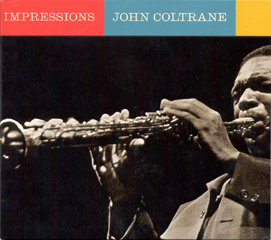
Impressions is an album of live and studio recordings by jazz musician John Coltrane, released by Impulse! Records in July 1963.

Interstellar Space is a studio album by American jazz saxophonist John Coltrane, featuring drummer Rashied Ali. It was recorded in 1967, the year of his death, and released by Impulse! Records in September 1974.

Live in Japan is a live album by American saxophonist John Coltrane, recorded for radio broadcast during his only Japanese tour in July 1966 at two Tokyo venues, Shinjuku Kosei Nenkin Hall and Sankei Hall. The recordings feature his last group, a quintet featuring Coltrane, his wife/pianist Alice, saxophonist/bass clarinetist Pharoah Sanders, bassist Jimmy Garrison and drummer Rashied Ali.

Om is a posthumously-released album by John Coltrane, recorded on October 1, 1965, one day after the recording of Live in Seattle, and one day prior to the recording of the music heard on A Love Supreme: Live in Seattle. The album, which features Coltrane's quartet plus three additional players, consists of a single 29-minute work that was split into two parts when released on LP. Om was issued by Impulse! in 1968, and was also included on The Major Works of John Coltrane, a compilation CD released in 1992.
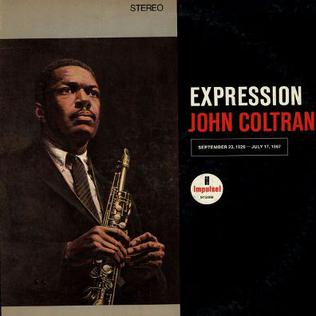
Expression is an album by jazz saxophonist John Coltrane, recorded in early 1967 and released in late September of that year, around Coltrane's birthday, and two months after his death. This was the first posthumous release of a Coltrane recording, and the last album he personally authorized.

First Meditations (for quartet) is an album by John Coltrane recorded on September 2, 1965 and posthumously released in 1977. It is a quartet version of a suite Coltrane would record as Meditations two months later with an expanded group. Along with Sun Ship, recorded a week earlier, First Meditations represents the final recordings of Coltrane's classic quartet featuring pianist McCoy Tyner, bassist Jimmy Garrison, and drummer Elvin Jones.
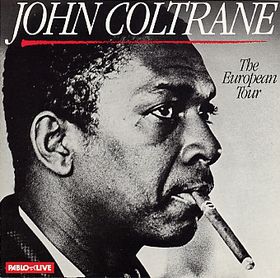
The European Tour is a posthumous album by jazz musician John Coltrane released in 1980 on the Pablo label. The tracks were recorded on October 22, 1963 at the Koncerthuset in Stockholm, Sweden during a two-week European tour which was produced by Norman Granz, and which included concerts in Oslo, Helsinki, Amsterdam, Milan, Kaiserslautern, Frankfurt/Main, Paris, Berlin, Munich, and Stuttgart. Additional tracks from the Stockholm and Berlin concerts appear on Afro Blue Impressions. Tracks from Stockholm, Berlin, Paris, and Stuttgart are featured on the 2001 Pablo compilation Live Trane: The European Tours.

Bye Bye Blackbird is a live album by jazz musician John Coltrane recorded on November 19, 1962 at the Konserthuset in Stockholm and released in 1981 by Pablo Records.

The John Coltrane Quartet Plays is an album by jazz musician John Coltrane, recorded in February and May 1965, shortly after the release of A Love Supreme.
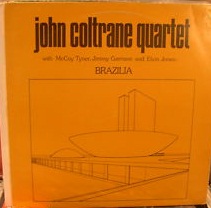
Brazilia is a live album by jazz musician John Coltrane. It was recorded at the Half Note Club in New York City on May 7, 1965, and was released in 1978 by Blue Parrot Records. On the album, Coltrane is accompanied by the members of his "classic quartet": pianist McCoy Tyner, bassist Jimmy Garrison, and drummer Elvin Jones.

Kulu Sé Mama is an album by jazz musician John Coltrane. Recorded during 1965, it was released in January 1967 as Impulse! A-9106, and was the last album released during Coltrane's lifetime.
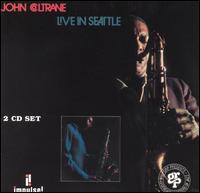
Live in Seattle is a live double album by jazz saxophonist John Coltrane, recorded in 1965 and released posthumously in 1971 on the Impulse! label. The album consists of a set played by Coltrane's quartet at The Penthouse on September 30, 1965. Along with the later-released A Love Supreme: Live in Seattle, recorded two days later at the same club, they are the only officially released live recordings of Coltrane's six-piece lineup from late 1965. The original double LP issue was expanded to 2 CDs for the reissue.

Live at the Half Note: One Down, One Up is a 2005 double CD compilation of two previously unreleased 1965 Friday radio broadcasts – March 26 and May 7 – at the Half Note Club in New York City, featuring John Coltrane with McCoy Tyner, Jimmy Garrison, and Elvin Jones.

Live in Paris is an album by jazz musician John Coltrane originally issued as 2 separate volumes in 1974 by BYG Japan and later reissued on CD by Charly Records.

Selflessness Featuring My Favorite Things is a posthumous album by jazz musician John Coltrane, released in 1969. The album juxtaposes two tracks recorded live at the 1963 Newport Jazz Festival with a single track ("Selflessness") recorded in a studio in Los Angeles in 1965.

Cosmic Music is a jazz album by John Coltrane and Alice Coltrane released after John Coltrane's death. John Coltrane only plays on two tracks, "Manifestation" and "Reverend King".

Offering: Live at Temple University is a live album by John Coltrane recorded in 1966 and released posthumously by Resonance Records on September 23, 2014, Coltrane's 88th birthday. The album won the Grammy Award for Best Album Notes and was well-received by critics. Proceeds from the album benefit the John Coltrane Home.
"26-2" is a musical composition written by American jazz musician John Coltrane. The song was recorded by Coltrane in 1960, but it released ten years later by Atlantic Records on an album entitled The Coltrane Legacy with a rhythm section composed of McCoy Tyner on piano, Steve Davis on bass, and Elvin Jones on drums. The composition itself is a contrafact of Charlie Parker's tune "Confirmation", with harmonic alterations to the original chord changes used by Coltrane in a number of his compositions. This harmonic modification is commonly known as Coltrane Changes, which have been most notably used in Coltrane's "Giant Steps". "26-2" is one of several contrafacts by Coltrane, others including "Countdown", a contrafact of Miles Davis's "Tune Up"; and "Satellite" from the album Coltrane's Sound, which is based upon the chord progression of "How High the Moon". Coltrane plays the first statement of the melody on tenor saxophone and switches to soprano saxophone for the last statement of the melody on the recorded version.

My Favorite Things: Coltrane at Newport is a compilation album by jazz musician John Coltrane released by Impulse! in 2007. It brings together tracks from performances by Coltrane's quartet at the Newport Jazz Festival in Newport, Rhode Island on July 7, 1963, and July 2, 1965.
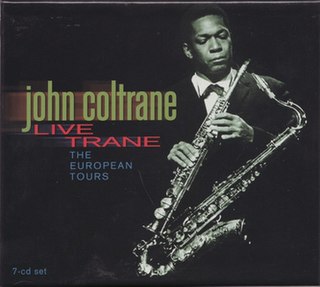
Live Trane: The European Tours is a 7–CD compilation album by American saxophonist John Coltrane containing music recorded live during 1961, 1962, and 1963 European tours, all of which took place under the auspices of Norman Granz's Jazz at the Philharmonic programs. The album, which was released in 2001 by Pablo Records, features Coltrane on tenor and soprano saxophones along with pianist McCoy Tyner, bassists Jimmy Garrison and Reggie Workman, and drummer Elvin Jones. In addition, Eric Dolphy is heard on alto saxophone, bass clarinet, and flute on a number of tracks.

















